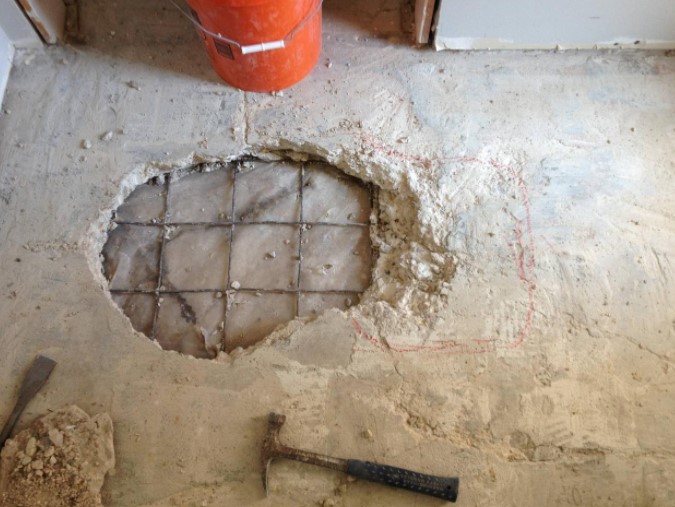If the water pressure in your pipelines has reduced or your water bill has just suddenly gone up or you might have just found some moist spots on your roof and ceiling, then your water system in your house is interrupted by slab leaks. There are some other ways you can make sure:
Signs of Slab Leak:
- You can find some Hot Spots on your floor.
- The flooring and ceiling are wet in some areas and water is dripping from the ceiling.
- You will notice a mildew smell all-around your room.
- Sometimes you can hear the sound of rushing water.
- Sound of dripping water late at night.
The water system is connected to all of your valves and appliances that need water. Also, your sewer system is attached to all the drains in your house and carries wastewater to the city sewer system. Any of these systems can leak from inside or underneath the ground. If the above-mentioned signs you have witnessed recently then calling the plumber is the best option for you. And if you left slab leaks unattended, it can lead to soil saturation under your home.
What is Slab Leak?
A slab leak is a leak that has occurred in the copper water lines that are running below your home’s concrete foundation. Those pipelines can develop leaks for several reasons from poor build quality to bad craftsmanship.
Some of the reasons for Slab Leak:
- Expansive Soil Shift: This is one of the common reasons for a slab leak in underground pipelines. Expansive soils have water-absorbing minerals in them. They expand after soaking water and as they expand, they bend the underground pipes and damage the plumbing system, and cause slow slab leaks.
A slow slab leak can keep putting water underneath the house and can trigger more soil expansion which will ultimately lead to profound damage to your home itself.
2. Faulty Installation: One of the main reasons for slab leaks is the faulty installation by the plumbers. When a plumber unrolls copper onto a rough surface that is full of rocks and debris, it can create dimples, and after the pipes were bent during the process of installation, the affected part of the pipe will result in a leak and end up being fractured because of the water pressure in the long run.
3. Abrasion From Concrete: this is another common cause of slab leak. Abrasion can damage a pipeline when it passes through slabs when it is not sleeved properly between them. When pipes get stroked against concrete on a daily basis, the constant friction can cause the pipes to erode and result in slab leaks.
4. Poor Quality Materials: Using materials in plumbing lines that are not up to the mark can cause slab leaks. Materials that react with underground elements and erode or can’t handle the pressure of the water are the reasons for slab leaks.
5. Temperature: When the temperature of certain places comes below the freezing point during the winter, water present in the pipes gets frozen. As the water freezes, its volume increases and creates immense pressure on the piper which results in a slab leak.
Even frequent changes in the temperature can cause the materials to contract and expand continuously. Which damages the pipes real bad.
How To Fix Slab Leaks?
- Pipe Rerouting and repiping: Sometimes there is no need to dig under concrete floors to fix the pipes. If the problem is in a very short section of pipes and the overall condition of the pipe is good, then rerouting is a quicker solution.
In this way, water can pass through the old pipes while the new pipes are getting installed. After installation, the old line is cut off and new ones are opened.
- Breaking Through The slab: This is the last option plumbers like to choose. Because though it looks like a direct path to reach the point of damage, this process is very disruptive and costly. Plumbers choose this option when no other solution is available.
This process can cause serious damage to the household. The whole house turns into a construction site for a few hours with dust all over, the sound of saws and jackhammers. After removing the old pipes plumber installed the new ones and finally put in a new slab. Contact the best slab leak repair Carlsbad for better results.
- Tunneling under the slab: Most households choose this option if possible because this way it costs the least damage. After digging tunnels and removing the dirt, new pipelines are installed and checked. And finally, refill the tunnel with the soil that was previously removed.
How to defend against Slab Leaks?
Prevention is better than cure. If we take necessary precautions, then we may refrain from leaking out plumbing lines from slab leaks.
Here are a few ways to do that:
- Avoid Using High Pressured Water: Excessive water pressure in the pipelines can weaken the pipelines and sometimes cause fractures. Avoiding using too much water pressure is a healthy option for the pipes.
- Keep the soil around your house moist: Keeping the soil moist and soft is better for the pipes underneath. It creates less pressure on the piper from outside.
- Always be careful of what you put down the drain: Chemicals that are used to clean drains and other households can damage the pipe. Also, check the PH level of your water because too much acidic water can cause the same damage as harsh chemicals.
- Annual Plumbing Checkup: This is what most people ignore. Routine checkups of your plumbing system might help you find the problems you don’t even know about. Plumbers will try to look for the signs of any possible leaks inside and outside the house. They will also check the things if they need any replacement or can be repaired instead. If the pressure is high enough for the pipes, plumbers will fix the water pressure.
All these precautions can save your water and sewage system from real damage in the future.

